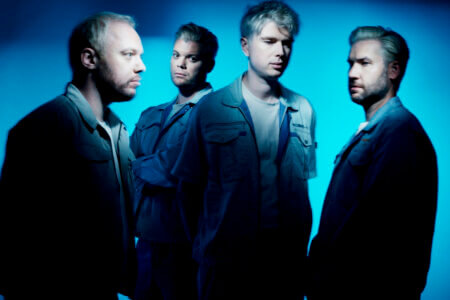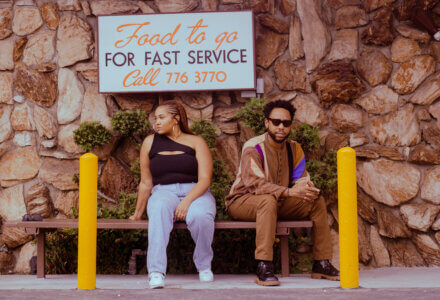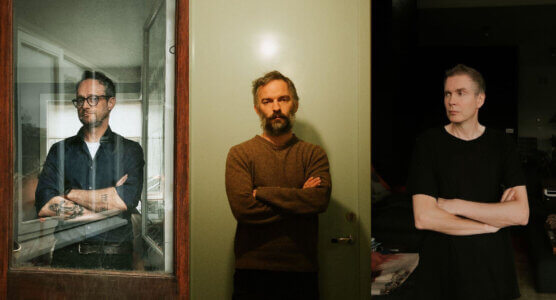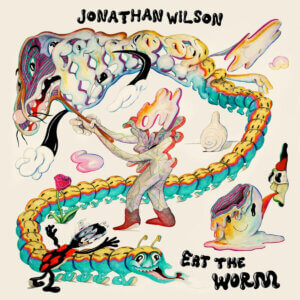Sparks Keep The Fire Burning
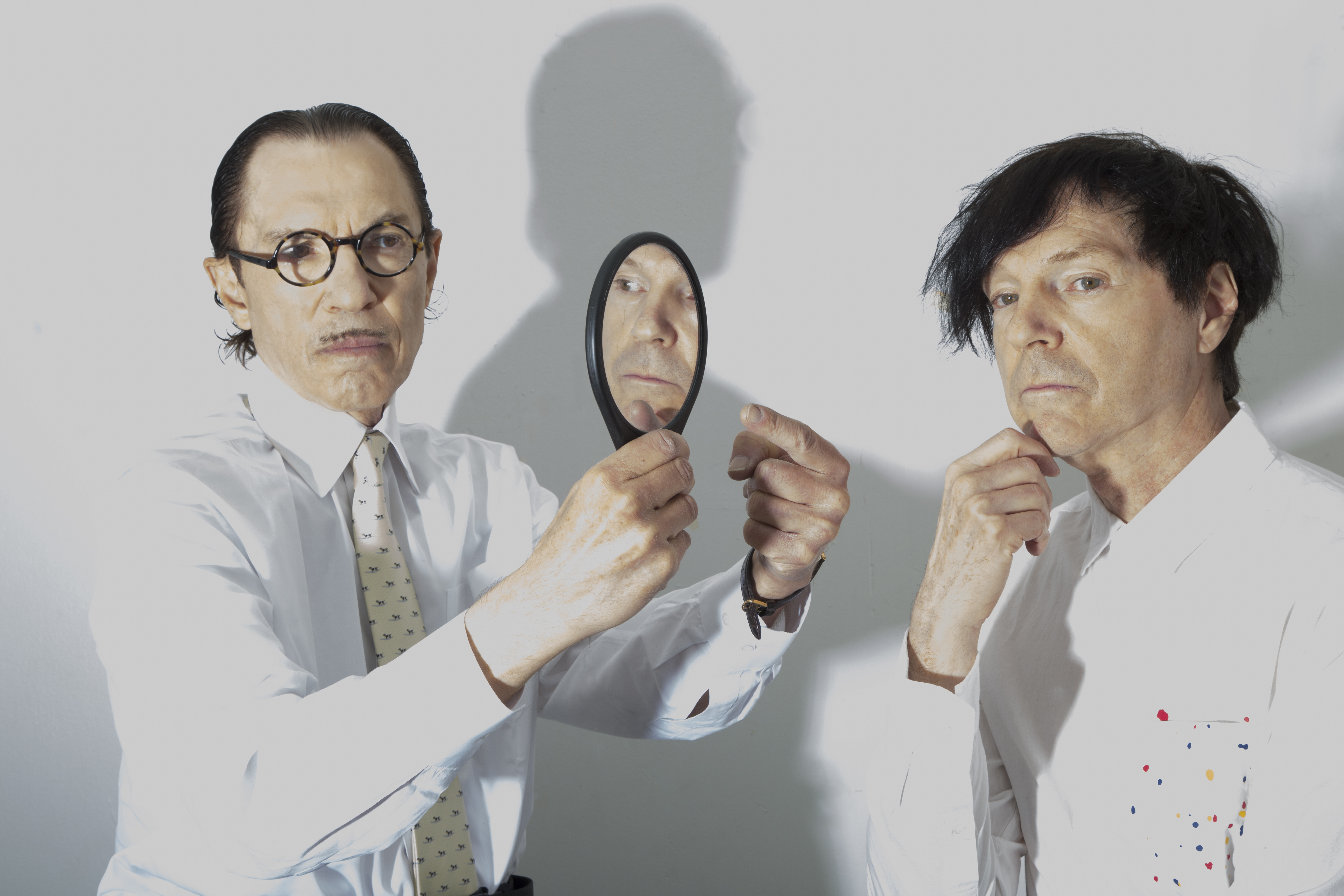
Sparks have never tried to be a conventional band, and in the long run it’s seemed to have worked out for them. Known for their strange sound and look the Ron and Russell Mael quickly became cult favourites, earning fans and even homages among their contemporaries. Along their classic Kimono My House and the electronically adventurous No. 1 In Heaven, soundtracks, collaborations, musicals and writing an upcoming film, the brothers have really stayed busy through their 40+ years in the business. We caught up with Ron and Russell ahead of their new album Hippopotamus to talk smashing stools, how Franz Ferdinand got them back to the studio and exactly where they get their ideas from.
Northern Transmissions: How did your collaboration with Franz Ferdinand come about and did you find anything in that you wanted to take bring onto this album?
Russell Mael: The project was first approached around ten years ago when they were first starting out. They had written that they were big fans of Sparks, so we met up with them in L.A.. We had discussed that it would be a cool to do something together at some point, and then it took ten years to actually happen. The whole process of writing was done in separate camps, we were writing in Los Angeles, and the songs they brought were written in Scotland. When there was enough material, we demoed seven or eight songs and then went to a studio in London and figure out arrangements.
Ron Mael: The recording process was actually really great. There were about 17 songs that we recorded, and they were done in 17 days, so it was a much faster process recording-wise than we’re used to. The vocals were even done live and with the band playing. The main thing we got from it was that we wanted to work within 3-4 minute song structures again, and with a traditional band format, presenting things live. We’d been working on a movie musical for about four years, and there was a break while we were waiting for the financial side to catch up, so we wanted to see if we could work in that way again. Things came together really quickly when we started recording again at the beginning of last year.
NT: What’s kept you coming back to these musical projects over the years, especially radio musicals like Ingmar Bergman, along with your soundtracks and the proposed ‘Mai, The Psychic Girl’ movie?
Russell: It’s just the thing of being curious and ambitious enough to apply what you do musically in some other context. Doing a movie musical has always been one passion that we had. The new film ‘Annette’ that we wrote that will be directed by Leos Carax, it’s in preproduction with Adam Driver and Michelle Williams committed to doing the lead roles. It’s pretty far along. It’s just about applying what you’ve done. We’ve done 23 albums now, so you’re always just curious and hungry to try different ways of what you do.
Ron: We’ve always been great lovers of cinema, so being able to participate in film not just in a soundtrack, but in actually shaping the writing of the narrative has always been a dream of mine.
NT: 23 albums deep, how do you not only stay creative but feel like you’re saying something new, while also maintaining your voice as a band?
Ron: One thing that we’re really fortunate to have, some people see it as a burden, is a sensibility that runs through everything we do. That’s there all the time, so the desire to keep going is trying to morph our ways into different contexts. We have the advantage of the two of us being the nucleus of what we do, so we’re able to enter different landscapes without worrying if it sounds like a band, or other concerns. The vitality of things comes through working in different formats, and working with a few amazing producers that have inspired. Tony Visconti, Giorgio Moroder and Todd Rundgren, now we’ve been working as of late without a producer, but we’ve retained what we’ve learned from them. Now we’re trying to see how far we can push things within the context of our sensibility. It gets harder and harder, but we have the freedom to work in the way that we want that other bands might not have.
NT: How do you think you’ve kept it together for so long considering all the brotherly bands that have come and gone over egos? If you have fought, what’s it usually about?
Russell: I think it’s only creative issues, and it’s related to the big picture. They’re not that significant, you discuss certain sounds or whether the chorus should be repeated a second time. On the bigger issues, there’s less friction.
Ron: It’s kind of a reflection of how our roles are separated and defined. It takes the sibling rivalry out of things that would break up the band.
NT: Are you still wring in the same Ron writes the music and Russell sticking to the vocal side, has the dynamic changed at all ?
Ron: One thing that has evolved is the process of writing. Before it would be me coming into the studio with a complete written song and trying to arrange it, but now we have the freedom where Russell has a studio in his place and is engineering things. We’re able to have the writing and recording be one thing on some songs, so it gives us more variety to come up with material. Previous to the last eight albums, we were always on the budget that you’d have recording, which was really prohibiting. We can work in a much more experimental way now.
NT: I also understand your biggest American hit with Jane Wiedlin (The Go-Gos) came out of a letter she sent to your fan club on her band’s stationary?
Russell: That was exactly the case. We still have this Sparks fan club since the 70s, Jane had had her own Sparks fan club in the valley in L.A.. One day we found out she had sent a letter in saying how much of a fan of Sparks she was, so we just said we should do something together. She was completely up for it, and Ron wrote the song “Cool Places” and Jane really loved it. We went in and recorded the song together in the living room of Giorgio Moroder’s house, since we were still with his production company. We also recorded “Lucky Me, Lucky You,” and she had a really great spirit.
NT: I also understand you got to work with Giorgio Moroder through a joke in an interview?
Russell: We wanted to work with him, but it was a lie at the time. But then the journalist was actually friends with him at the time, she was a German journalist who knew Giorgio. We had to fess up to our sins but she asked if we wanted to be introduced to him. Giorgio was really up for working with us too.
NT: Where did Ron’s infamous piano bench smashing come from? Was this a product of the Who or a weird rebellion for keyboard players?
Ron: When we first started, we always admired the British bands much more than the American bands. Especially The Who and The Kinks, but I always wanted to be Pete Townshend but when you’re a keyboard player there’s not a lot of possibilities outside of writing to be him. I went the other direction since I was tied down to the bench, and I didn’t wanted to be animated keyboardist, instead I wanted to be Pete so that’s where that probably came from.
NT: With all your time away from a typical album, did you want to filter everything you’d done with musicals, Franz Ferdinand and soundtracks into this one or just go back to regular Sparks cut-and-dry?
Ron: Working on the film pieces where thinking are often hyper emotional and often orchestrated mentored some of the songs. We have that now to draw from, and we’re not afraid to be emotionally over the top if it fits in the right way. There’s restrictions on what pop songs are, and we love trying to bend those while remaining in that world. All of those things are infused in the album but we knew we wanted to be able to play it live with a real band.
NT: Considering you’ve had such a shifting cult following over the years, how has it been seeing the crowds change?
Russell: Curiously enough with the big body of work, there’s people that have come in midway, or even more recently so the makeup of the audience is pretty diverse. Of course there are also people who know all our music. We did that 21 nights event where we did one of our albums every night in London, that also showed the makeup of which fan would come to which album. Now over time we’re finding the audience is coming with a knowledge of the entire catalog, thanks to the internet, especially fans who might not have been there in the beginning.
Ron: The internet’s made everything contemporary, even stuff that’s far enough back in your discography to be forgotten is easy to find.
Words by Owen Maxwell
Latest Reviews
Trending
Tracks
Advertisement
Looking for something new to listen to?
Sign up to our all-new newsletter for top-notch reviews, news, videos and playlists.





